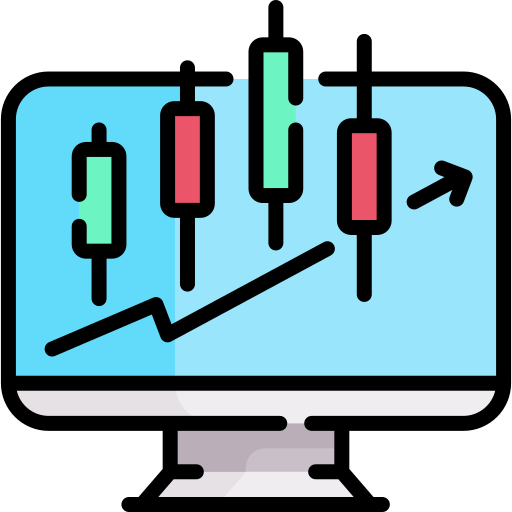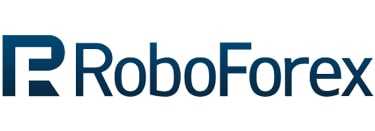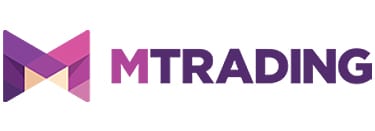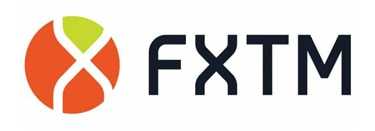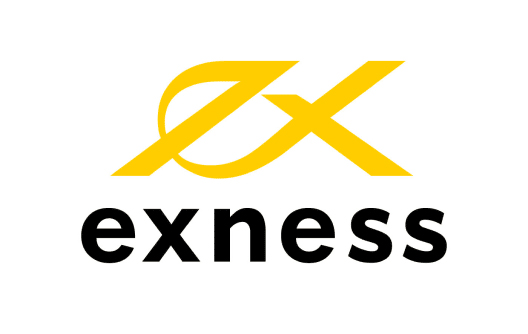- Fully Regulated
- Expertly Reviewed
- Secure & Trusted
- Transparent Fees
- Mobile Friendly
Find The Best Broker For Your Trading Level.
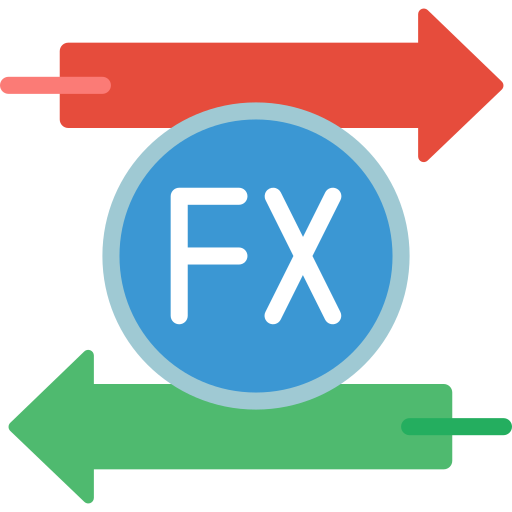
NASDAQ forex Brokers

Cryptocurrency Trading platforms
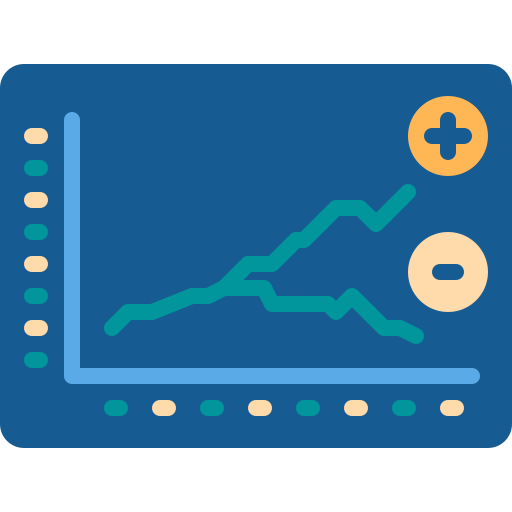
Volitality 75 Forex Brokers
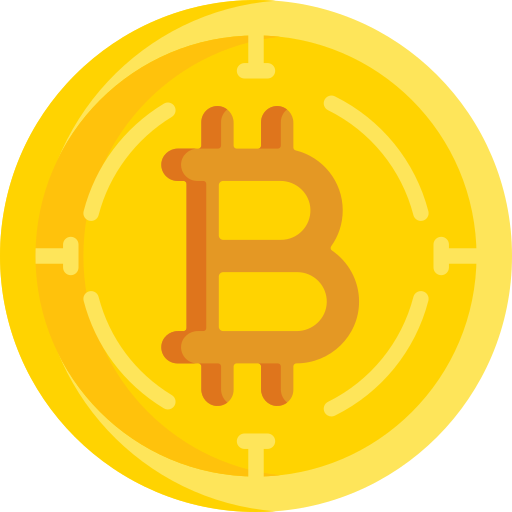
How to Buy Bitcoin
Quick Content
Best Forex Brokers in Rwanda
Forex Trading
Basics
Forex
Terminology
Currency
Pairs
How to Start Trading in Rwanda ?
Forex Trading
Strategies
Forex
Charting
Forex Trading Risk Management
Forex Trading Platforms
Pros and Cons of Forex Trading
Forex Trading Brokers in Rwanda
| 🥇 Forex Broker | ✔️ Accepts Rwandans? | ⚖️ Regulation | 📈 Max Leverage | 📉 Min Deposit | 👉 Open An Account |
| 1. Exness | ✔️ Yes | FSA, CBCS, FSC, FSC BVI, FSCA, CySEC, FCA | Unlimited | 10,200 RWF | 👉 Open Account |
| 2. Tickmill | ✔️ Yes | Seychelles FSA, FCA, CySEC, Labuan FSA, FSCA | 1:500 | 102,000 RWF | 👉 Open Account |
| 3. IC Markets | ✔️ Yes | ASIC, CySEC, FSA, SCB | 1:500 | 204,000 RWF | 👉 Open Account |
| 4. Pepperstone | ✔️ Yes | ASIC, BaFin, CMA, CySEC, DFSA, FCA, SCB | 1:200 (Retail) 1:500 (Pro) | 102,000 RWF | 👉 Open Account |
| 5. AvaTrade | ✔️ Yes | CBI, BVI FSC, ASIC, FSCA, JFSA, FFAJ, ADGM, CySEC, ISA, KNF, IIROC | 1:30 (Retail) 1:400 (Pro) | 102,000 RWF | 👉 Open Account |
| 6. XM | ✔️ Yes | FSCA, IFSC, ASIC, CySEC, DFSA | 1:888 | 5,100 RWF | 👉 Open Account |
| 7. Capital.com | ✔️ Yes | FCA, ASIC, CySEC, NBRB, FSA | NBRB – 1:100 FCA – 1:30 ASIC/CySEC – 1:30 | 20,400 RWF | 👉 Open Account |
| 8. RoboForex | ✔️ Yes | IFSC | 1:2000 | 10,200 RWF | 👉 Open Account |
| 9. HF Markets | ✔️ Yes | FSCA, CySEC, DFSA, FSA, FCA, FSC, CMA | 1:1000 | 10,200 RWF | 👉 Open Account |
| 10. OANDA | ✔️ Yes | IIROC, ASIC, CFTC, NFA, FCA, FFAJ, MAS, MFSA | 1:200 | 0 RWF | 👉 Open Account |
👉 You’ll learn all you need to know about being a great trader and which forex brokers in Rwanda are best suited for your style of trading in this comprehensive guide. Rwandan traders can easily take advantage of the competitive, exciting environment offered by forex trading as it is accessible to all over the age of 18.
➡️ The Rwandan government supports a free foreign exchange market in which commercial banks may acquire foreign currency at regulated floating exchange rates.
➡️ Since the civil war ended in 1994, Rwanda has been working to rebuild its economy and society. The GDP of the emerging country has increased by 5 percent annually during the last decade.
➡️ Although the Rwandan franc (RWF) has achieved great progress over the last several years, foreign exchange market participants sometimes overlook it as a viable option.
➡️ A broker must be registered with the Rwanda Forex Bureau Association Information System (RFBAIS) and have a license from the National Bank of Rwanda before they may trade RWF. Therefore, Rwandans may only engage in trading international or foreign currency pairs with the help of offshore/international brokers.
➡️ Rwanda’s trade potential should be weighed against the higher dangers associated with dealing with the exotic currencies of developing nations if a trader is considering operating in the RWF.
👉 How profitable is forex trading for individuals and retail traders? How much do you need to start trading forex in Rwanda? Can you keep your full-time job while you trade forex part-time? What are the significant risks involved with trading forex in Rwanda?
👉 These are just a few questions that many Rwandan traders may have as beginner forex traders. Explore our website to find the answers to these questions and more.
👉 Foreign Exchange Trading is a legal activity in Rwanda that is governed by the National Bank of Rwanda (BNR). While the Bank of Rwanda does not officially regulate forex brokers who carry out financial activities, regulators such as the FSCA, FCA, CySEC, and others, provide Rwandans with protection.
👉 We reveal the best brokers with verified regulations who offer their services locally in Rwanda. Rwandans can rest assured that these are trusted and legitimate brokers that garner a high trust score and/or rating.
Forex Trading Pros and Cons
| ✔️ Pros | ❌ Cons |
| Because of its adaptability and lack of time commitment, forex trading may be pursued as either a side hustle or a full-time career | There is no one place to trade where you can be sure of zero risk. Since counterparty risk cannot be eliminated, traders in the foreign exchange market must constantly monitor their positions and develop strategies to minimize losses |
| Because of its size and the fact that it spans many time zones, data regarding this industry is readily available | Forex markets provide the highest leverage in the financial world, meaning that the potential for profit or loss is directly proportional to the amount of leverage used (1:1 and more than 1:3000 in some cases) |
| Online forex trading provides a wide range of opportunities for participants, including spot trade and future agreement, facilitating high trading volumes and catering to a wide range of traders’ preferences | Due to the continuous nature of the market, managing and operating a forex trading business may be a full-time job in and of itself |
| When comparing transaction costs across marketplaces, online forex trading stands out as having some of the lowest fees | Many nations still do not have enough rules in place to govern the foreign currency market |
| Foreign exchange markets, unlike traditional businesses, are available around the clock. Traders may set their own schedules and decide how often they want to engage in transactions | Traders’ hopes for short-term gains leave them vulnerable to the market’s wild swings |
| Forex is appropriate for both short-term and long-term traders | The direction of currency exchange rates may be affected by both economic and political factors worldwide. It is difficult to assess these elements and come to sound judgments regarding which ones are best to trade on |
| When compared to other markets, the Forex market is one of the largest in terms of overall daily trading volume | |
| Every step of the foreign exchange market may be broken down into the buying and selling of currency pairs. Although this seems to restrict your trading options, the vast number of currency combinations provides a great deal of diversity | |
| In comparison to other markets, the Forex market requires a little opening deposit to create a trading account | |
| With leverage, even a little investment may provide substantial returns | |
| Going short, or selling a currency pair in the hopes of buying it back at a cheaper price, is a wonderful risk-mitigating strategy that is always available in the forex market | |
| Due to the sheer number of transactions in the forex market, technical analysis will be more applicable there than in other markets | |
| The high number of transactions in the foreign exchange market makes price manipulation difficult | |
| Automated trading systems work effectively in the Forex market |
Step-by-Step on How to Start Trading Forex in Rwanda
➡️ Step 1 – Determine what type of trader you are
➡️ Step 2 – Evaluate the amount of money you can risk
➡️ Step 3 – Decide on a trading strategy accordingly
➡️ Step 4 – Research forex brokers and register a demo account
➡️ Step 5 – Register an account, deposit funds, and start trading
✅ Step 1 – Determine what type of trader you are
👉 There are several distinct sorts of traders and a corresponding variety of timeframes that can be used to formulate and implement trading strategies.
👉 Market warriors may adjust for factors outside their control by using timing. Position leverage, the subtleties of various currency pairings, and the impact of both anticipated and unexpected news releases are all examples of such factors.
👉 For this reason, time is of the essence in the foreign currency market, although inexperienced traders often overlook it.
👉 Many different labels and monikers are used in the trading industry. However, when time is factored in, there are three main types of traders and trading strategies: day traders, swing traders, and position traders.
Day Traders
👉 In the absence of a more precise definition, we might say that a day trader engages in transactions for a single day. Traders that engage in high-volume activity and who do not like holding positions through the end of the session fall into this category.
👉 One or more deals with a total value of 10x to 100x the average daily volume are common goals for a day in the life of a short-term trader. This is done so that a larger sum of money may be made from a minor change.
👉 Consequently, traders that operate in proprietary trading environments use charts with shorter time frames of one, five, or fifteen minutes. Day traders are also more likely to make use of technical trading patterns and highly volatile currency pairings. These experts are searching for future potential in the market, but they recognize the value of a long-term fundamental bias.
Swing Traders
👉 Swing traders use a wider time horizon to predict market movements, sometimes holding positions for many hours or even days.
👉 Swing traders, in contrast to day traders, anticipate a reversal in trend to benefit from an entrance into the market. To this end, a swing trader’s approach places more emphasis on time than that of a day trader.
Position Traders
👉 The fundamental distinction between the position trader and the other two types of traders is in the length of time they spend analysing the market. They focus on the big picture rather than reacting to daily or weekly fluctuations in the market, as is the case with day and swing traders.
👉 Positioning techniques may last for many months or even years. Therefore, traders will consider technical patterns, but they will stick to fundamental models and possibilities with a longer time horizon.
✅ Step 2 – Evaluate the amount of money you can risk
👉 You should never risk more money than you can afford to lose while trading Forex. This is because most novice Forex traders experience significant financial setbacks during the first few months of trading.
👉 Although you need not be one of them, remember that learning to trade is difficult and that you should approach risk with caution if you are just starting. However, keep in mind that the larger your initial deposit is with a Forex broker, the lower your overall transaction charges will be.
✅ Step 3 – Decide on a trading strategy accordingly
👉 Even if some degree of discretion is utilized, every trader in the foreign exchange market requires at least one fundamental strategy to recommend trade entry and exits. The “edge” of any approach should be proven over time; a method without significant backtesting is useless.
👉 It can be tempting to believe that you could purchase access to a “holy grail” technique, but the truth is that there are many effective Forex trading strategies for beginners available for no cost online.
👉 You need to have faith that a method will work over the long run to employ it successfully, which is why backtesting is crucial.
👉 Get as much information as possible regarding trading Forex. Do not stress yourself over understanding every signal and feature. Instead, put your time and energy into reading disputes and explanations from professional traders who are willing to confess to losing streaks.
✅ Step 4 – Research forex brokers and register a demo account
👉 Each Forex broker has its own minimum deposit amount, and some are more suited to trading strategies than others. Once you have answered the first two questions, you will have a better sense of which Forex brokers are right for you.
👉 Make a shortlist of the brokers you are interested in utilizing evaluations from respected broker websites that highlight the top Forex brokers for beginners. Opening one of these no-obligation demo accounts is as simple as registering with the broker.
👉 In the Forex market, demo accounts are typically available for 30 days, while some brokers extend this period of availability indefinitely. A demo account is a risk-free way to test your trading strategies using virtual money.
✅ Step 5 – Register an account, deposit funds, and start trading
👉 Once you fund your live trading account with real money, you may begin trading using real funds. Compared to virtual trading, you will notice a significant difference here. Try not to lose too much money in any one deal and keep your cool when your trades fail.
👉 You should periodically evaluate your forex trading performance and subsequent outcomes. There is a good chance you will not succeed right away, but you may become better as you train. Prioritize limiting losses until you can trade profitably and confidently.
5 Best Currency Pairs for Beginner Rwandans to Trade
👉 All new forex traders will confront the challenge of deciding which currency pair is safe to trade to prevent losing half of their initial deposit on their first position. The answer is as simple as it gets: the safest currency pairings are also the steadiest.
👉 A “stable currency pair” is one whose value is not prone to huge movements in a fleeting period. The major forex pairs are the most dynamic and least unstable pairings based on these characteristics.
👉 The liquidity of these pairs is bolstered by high trading volume, notably from institutional traders. If a currency pair is extremely liquid, you can rest assured that you will not be trapped with an asset you cannot sell because no one will pay the price you are asking.
👉 For Rwandan novices, the best and most reliable currency combinations are:
➡️ EUR/USD
➡️ GBP/USD
➡️ USD/CNY
➡️ GBP/JPY
➡️ EUR/CHF
EUR/USD
👉 The Euro and the US Dollar are used in most currency dealings. This pair may have a high amount of liquidity since it comprises the currencies of two big economies.
👉 The EUR/USD and the GBP/USD have a positive connection, whereas the USD/CHF has a negative association. Trade this pair is best done when European and American trading hours coincide.
GBP/USD
👉 The currency pair of the British Pound and the US Dollar is likewise quite active. It has a positive correlation with EUR/USD and a negative correlation with USD/CHF.
👉 When trading the “cable” (GBP/USD), Rwandans must monitor any notable news that might affect the US dollar or the British pound. Basic metals and Brent crude oil, for example, tend to move in lockstep with the British pound.
USD/CNY
👉 Because of the country’s strong economy, the US dollar/Chinese yuan pair is rare, and the Chinese Yuan is a stable currency. Furthermore, because of the pair’s modest volatility, Rwandan newcomers might gain from daily price fluctuations without taking on too much risk.
GBP/JPY
👉 Unlike other currency pairs, GBP/JPY does not contain the US dollar. It is influenced by events in Japan and the United Kingdom.
👉 Rwandan traders might gain hundreds of pips on a single transaction thanks to strong changes in the pair. During the short overlap between the Asian and European sessions, trading this instrument might be highly rewarding.
EUR/CHF
👉 Although the EUR/CHF (Euro/Swiss Franc) currency combination is not widely traded, it is renowned among Rwandan traders. This is particularly relevant considering its negative relationship with EUR/USD.
👉 During the European trading period, trade activity in EUR/CHF peaks. The European Central Bank (ECB), as well as labour and commerce numbers from Europe, are closely watched by currency traders in this pair.
👉 To predict future changes in the Swiss currency, Rwandan traders should monitor economic variables such as GDP, inflation, and employment rates in Switzerland.
3 Best Currency Pairs for Professional Rwandans to Trade
👉 Expert forex traders need innovative technology as well as a dependable broker. Expert traders may anticipate larger profits and make trading their primary source of income.
👉 The attitude and strategies employed by professionals in trading are frequently more advanced than those utilized by amateurs.
👉 However, regardless of one’s level of expertise, the technique for picking currency pairs to trade may be implemented universally. Expert currency traders may more correctly spot lucrative currency pairings with enhanced fundamental and technical analysis.
👉 There are many excellent currency pairs accessible to knowledgeable Rwandan traders, but here are a few of the best:
➡️ USD/JPY – It has higher volatility and follows a linear pattern than the EUR/USD pair. This foreign exchange currency pair produces lucrative pip possibilities and comprehensive market analyses, making it a suitable alternative for seasoned traders.
➡️ USD/CAD – This currency pair is heavily influenced by the price of Canadian crude oil. When oil prices in Canada rise, the value of the Canadian dollar rises, and when oil prices fall, the value of the Canadian currency falls.
➡️ GBP/JPY – This pair may appeal to you for a variety of reasons, including its high volatility, capacity to manage risk, and wealth of trading tools. When trading the GBP/JPY currency pair, bear in mind that the relationship between the yen and the price of energy may have a significant impact on the British pound’s value.
8 Best No-Deposit Forex Brokers in Rwanda
👉 To understand how a No-Deposit Bonus works, Rwandans can refer to these points:
➡️ The no deposit bonus requires nothing from a trader beyond registration, in contrast to other forms of incentives. As a result, it is convenient for traders since it requires no upfront cost. It provides traders with a starting capital that may be withdrawn in the event of a successful deal.
➡️ Trades can be made in a simulated or live trading environment before any money is ever deposited, giving players a leg up on the competition.
➡️ Traders can try out the platform, make some trades, and bail if they do not like it all without risking any of their own money using a no deposit bonus trading account.
👉 The best No-Deposit Forex Brokers in Rwanda are:
➡️ XM – $30 No-Deposit Bonus
➡️ RoboForex – $30 No-Deposit Bonus
➡️ InstaForex – $1,000 No-Deposit Bonus
➡️ SuperForex – $88 No-Deposit Bonus
➡️ MTrading – $30 No-Deposit Bonus
➡️ FBS – Up to $100 Quick Start and $140 Level-Up Bonus
➡️ Trade Nation – 1,000 points when Ugandans register an account
➡️ Tickmill – $30 No-Deposit Welcome Account
XM
Min Deposit
USD 10
Regulators
IFSC, CySec, ASIC
Trading Desk
Meta Trader 4
Crypto
Yes
Total Pairs
55
Islamic Account
No
Trading Fees
Low
Account Activation Time
24 Hours
👉 With the authentication of a Real Account, XM offers a $30 No Deposit Bonus to new Rwandan traders who have never registered before.
👉 The no-deposit bonus is for trading purposes only, but any gains gained are yours to keep after the number of transactions in the linked real trading account reaches 10 micro-lots (0.1 standard lots) and 5 round turn deals.
RoboForex
Min Deposit
USD 10
Regulators
IFSC
Trading Desk
Meta Trader 4
Crypto
Yes
Total Pairs
32
Islamic Account
No
Trading Fees
Low
Account Activation Time
24 Hours
👉 Register and verify a real money trading account with RoboForex to get a $30 bonus. With proper planning and execution, trading may be a terrific way to increase your wealth. After trading the required number of lots, the bonus and any profits gained from trading it are yours to keep.
InstaForex
Min Deposit
USD 1
Regulators
CySEC, FSC
Trading Desk
Metatrader 4
Crypto
Yes
Total Pairs
4
Islamic Account
No
Trading Fees
Low
Account Activation Time
24 Hours
👉 When you join InstaForex as a trader, you will get access to more than 300 different market tools right now. New clients of InstaForex are offered the opportunity to get a $1,000 reward if they sign up with the broker.
👉 After a new trader has been approved for a welcome bonus, the bonus monies will be deposited into their trading account.
SuperForex
Min Deposit
USD 1
Regulators
IFSC
Trading Desk
Metatrader 4
Crypto
Yes
Total Pairs
300
Islamic Account
No
Trading Fees
Low
Account Activation Time
24 Hours
👉 When Rwandans register a SuperForex Account, there are no prior requirements to get SuperForex’s $88 bonus. You may submit a request for it using your own trading account’s login page after you have created a real-money account and verified your identity.
👉 To qualify for SuperForex’s no-deposit bonus, you must set your account’s base currency to US dollars.
MTrading
Min Deposit
USD 100
Regulators
Not Regulated
Trading Desk
Meta Trader 4
Crypto
Yes
Total Pairs
–
Islamic Account
Yes
Trading Fees
Low
Account Activation Time
24 Hours
👉 MTrading is offering a free $30 trading credit to any Tanzanian traders who open a real money trading account with the broker. However, to get this no-deposit bonus, Tanzanian players will have to complete the whole verification procedure.
FBS
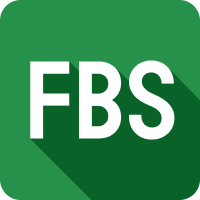
Overall Rating
- 4.7/5
Min Deposit
1 USD / 1 020 RWF
Regulators
IFSC, FSCA (South africa), ASIC, CySEC
Trading Desk
MetaTrader 4, MetaTrader 5, FBS Trader – all in one mobile trading platform.
Crypto
Yes
Total Pairs
250
Islamic Account
No
Trading Fees
Low
Welcome Bonus
$140 / 142 877 RWF
Account Activation Time
Instant
👉 FBS, which operates under the supervision of the International Financial Services Commission (IFSC), offers two types of zero-deposit bonuses. FBS provides a $100 Quick Start Bonus for use on the FBS Trader platform to enable novice traders to get their feet wet with no danger to their own funds.
👉 If, however, you comply with the steps outlined by FBS, you just could get a free $140 bonus with no deposit required. FBS’ no-deposit bonus is withdrawable after certain conditions are met and until this time, the bonus can only be used as trading credit for carrying out trading activities.
Trade Nation
Min Deposit
USD 0
Regulators
FSCA
Trading Desk
–
Crypto
Yes
Total Pairs
33
Islamic Account
No
Trading Fees
Low
Account Activation Time
24 Hours
👉 Tanzanians may join Trade Nation’s loyalty program and get 1,000 trading points after proving their identity and creating a trading account.
👉 Moreover, for every transaction made in the trade nation’s basic currency, Tanzanian merchants were able to accumulate points in their Trade Nation Account.
Tickmill
Min Deposit
USD 100
Regulators
CySEC, FCA, FSA, FSCA, Labuan FSA
Trading Desk
Meta Trader 4
Crypto
Yes
Total Pairs
62
Islamic Account
Yes
Trading Fees
Low
Account Activation Time
24 Hours
👉 You must register for a brand-new trading account with Tickmill to get the $30 Welcome Bonus. Use the extra money to make trades and earn up to $100. However, you cannot cash out unless you sign up for a Live MT4 account and make a minimum deposit of $100.
Forex Trading – Stock Trading – Cryptocurrency Trading Compared
| 💰 Forex Trading | 💰 Stock Trading | 💰 Crypto Trading | |
| ⏰ Market Hours | 24/5 | 9 am – 3 pm (GMT+3) Monday to Friday | 24/7 |
| ➡️ Trading Speed | Instant | Slow | Instant |
| 📈 How is it traded? | OTC | Exchanges | OTC/Exchanges |
| 💵 Price Fluctuation | Fast | Slow | Fast |
| 📉 Min. Trade Size | 0.01 lots | 1 share or fractions | 1 lot or fractions |
| 📊 Volatility | High | Low | High |
| 💧 Liquidity | Very High | Blue Chip Stocks are the most liquid | Only major crypto e.g. BTC, ETH, LTC, DOGE, etc. |
| ⬆️ Trading Volume | High | High | Medium |
| ⚖️ Regulation | $6.6 Trillion | 7,369,200 | $500 Billion+ |
| 📊 Investment Horizon | Short, Medium, Long-Term | Medium and Long-Term | Short, Medium, Long-Term |
| 📉 Average Leverage Ratios | 1:100 – 1:3000+ | <1:100 | <1:10 |
| 📈 Susceptibility to Macroeconomic Factors | Yes Rarely as turbulent as Crypto | Yes Economic Performance | Yes Consumer Behaviour Supply and Demand |
How to Choose a Forex Broker in Rwanda
👉 When trading, your broker is a crucial component. You entrust them with your funds, depend on them to carry out your deals and seek their help when things go wrong.
👉 If you do not want to put your money in the hands of a shady broker, it is in your best interest to conduct your research and choose the right one.
👉 You might require a broker that offers a zero-spread account, or you will want one that offers a virtual private server (VPS), a large deposit bonus, VIP account types, or some other unique benefit. Below, you will find some things to think about before deciding on a Forex broker.
Regulation and Authorization
👉 Even while all trading contains some degree of danger, you may lessen that risk by working with a reputable online forex broker.
👉 Choosing a broker who abides by the rules and regulations is essential. Traders must feel safe and valued, and the regulatory body’s role is to safeguard the customer and guarantee the safety of their money while it is in the custody of the broker.
👉 It is important to verify that they are registered with the appropriate regulatory agency and that they have the necessary permissions to do business in your nation. You should never engage in financial transactions with a broker who is not licensed to do business in your jurisdiction.
Trading and Non-Trading Fees
Spreads and commissions
👉 Since spreads and commissions are so important to executing a winning trading strategy, you should look for a broker that provides transparent information about these fees for the instruments you intend to trade most often.
👉 While the EUR/USD is the most often traded currency pair in the forex market, traders will find that the trading conditions offered by most brokers are similar, the situation is quite different when wanting to trade a single stock, an index, or a cryptocurrency.
👉 Find the instruments you are interested in trading, and then compare the terms offered by several brokers.
Deposit and Withdrawal Fees
👉 Even though many brokers advertise that they do not charge commissions on deposits or withdrawals, clients should be wary of such claims since they are frequently followed by fine print or the sudden appearance of a hidden fee.
👉 When deciding between brokers and before creating an account, it is crucial to have a thorough understanding of the various deposit and withdrawal options, the specifics of making a deposit or withdrawal using each option, and any associated fees and expenses.
Range of Markets
👉 When traders refer to “instruments,” they are not referring to trading tools, but to the underlying assets (currencies, indices, equities, etc.) that a broker makes available for trading.
👉 Depending on the broker, the available trading instruments may be little. Many other brokers provide a plethora of instruments to choose from. This may vary even across accounts held with the same broker.
👉 When it comes to foreign exchange, every broker gives you access to trading in all the main currency pairings. If you are interested in trading exotic currency pairings, single stocks, or other unusual instruments, it is in your best interest to review the possibilities that are currently accessible.
Minimum Deposit
👉 The minimum deposit required by most large brokers can range between $50 and $500. If you are just starting in the market or have a little budget, this is something to think about.
👉 If money is limited, you may want to consider using a low deposit Forex broker; some of these establishments will welcome traders with as little as a single dollar.
👉 You may want to look for a broker with an especially large minimum deposit if you plan to trade often and have a substantial amount of funds at your disposal.
Customer Support
👉 You need to be able to contact someone who knows what they are doing and can help you out if anything goes wrong with your trade or your account. If you need help, quickly and reliably, choose a broker that can provide it.
👉 Figure out how to contact them and examine them closely. With most modern brokers, you can now have a conversation with them over the phone or in a chat room before committing to a real account.
👉 To get help from a broker’s support team, you may need a real-money account with them. Keep in mind that you may try out the customer service without jeopardizing any of your own money by opening a real money account with no initial deposit.
👉 Important things to keep in mind while providing customer service are:
➡️ Can you contact them through a live chat feature, a phone number, or an email address, or do you just provide one of these options?
➡️ In terms of platform compatibility, do they also support mobile devices or is desktop the only option?
➡️ Do I need to call support if I can find answers in the knowledge base?
Accounts and Account Currencies
👉 Most brokers provide a wide selection of account kinds. You may and should check them out before creating an account to make sure you get the right kind of service.
👉 These accounts may range from the very low-risk cent or nano accounts to those that allow trading of actual equities and exchange-traded funds (ETFs). Some brokers will let you open an account in a currency other than the two most popular ones (USD and EUR), but many will not.
👉 To make matters more complicated, the fees associated with making deposits and withdrawals may increase if your account is denominated in a currency other than that of your bank or e-wallet.
Server Location and VPS
👉 A trading server location is a thing to consider if you are not utilizing a Virtual Private Server and you require high execution speed with low latency.
👉 The distance between your client and the servers may cause some execution delays. Usually, this is an issue only if you hire expert advisers who open and shut orders regularly.
👉 Using a broker that provides a Virtual Private Server is highly recommended if you want to use skilled consultants (VPS).
👉 When using a broker that offers a virtual private server (VPS) service, you may take advantage of the VPS’s proximity to the brokerage’s servers. In addition, the broker can more easily provide you with technical help.
👉 In addition, VPS is typically free with some brokers if you trade above a certain volume or have a certain amount in your account.
Special Features and Additional Resources
👉 These days, most brokers provide the same services—including the ability to make deposits and withdrawals and trade with a fixed spread—but others go above the norm. Some brokers offer advantages over others that may influence your decision to work with them, including:
➡️ Social Trading
➡️ Copy-Trading
➡️ Loyalty Programs and Rebates
➡️ Referral or Affiliate Programs
➡️ Additional Trading Tools
➡️ Specific Education relating to the broker
Trading Platform
👉 The various trading platforms appear comparable since they all include standard charting tools and trade screens. In most cases, they also feature market analysis gleaned from news sources or social media.
👉 Demo accounts may be used to evaluate several forex platforms before making a final decision. This gives you the ability to examine the available features, how they function, and how they vary from one platform to another.
Education
👉 Traders must keep learning new things and growing as an individual on every level. This entails looking through the instructional material available. Rwandan traders must ask the following questions when they evaluate a broker’s Educational Material:
➡️ Is there not a fee?
➡️ Is there enough information provided?
➡️ Is there sufficient difficult content available, such as webinars, professional guidance, and other resources, if you are an advanced user?
Trading Limits
👉 When evaluating a broker you must make sure that the minimum transaction size, as well as the maximum deal size, are suitable for your requirements. In most cases, this ranges anywhere from 0.1 lots to 100 lots.
👉 Beginner traders would benefit from trading nano lots, which are available in cent and micro-accounts.
The policies regarding requotes and slippage
👉 When comparing forex brokers, Rwandans must evaluate whether they engage in requotes and slippages. When your broker’s server sends you an error, “no price,” message and signal, and you are unable to complete a trade at the going market price, you may request a re-quote.
👉 For this reason, your purchase will not be processed. When your broker is unable to execute your order at the price you provide, this is known as slippage.
👉 Instead, the transaction is carried out according to the next subsequent quote, which might be higher or lower than the price you specified.
👉 Foreign exchange rates are subject to rapid fluctuations due to market circumstances, particularly during periods of high volatility such as major economic events or announcements.
👉 The real-time nature of live trading makes it conceivable that your position will not be started at the requested price and will instead open at the newly quoted price.
👉 Whether the former or latter occurs is dependent on the configuration of your broker’s server but knowing this is crucial if you want to trade during the publication of significant economic news in the hopes of capitalizing on large price swings.
Islamic Account
👉 You should ask your broker whether they have Islamic accounts if you follow the Islamic faith. These accounts do not include any kind of swap or overnight fees, and thus your religious beliefs are protected.
Bonuses and Promotions
👉 The bonus offers of certain brokers are heavily promoted because of their popularity. However, there are usually several requirements to meet before you may withdraw Forex bonuses.
👉 Before committing to a bonus, be sure you understand all the terms and circumstances involved. You should not tie up your funds with unrealistic requirements or give yourself false optimism in the form of bonuses.
Deposit and Withdrawal Options
👉 Methods of depositing and withdrawing funds are crucial. However, these days, the best and most reputable brokers have all they need.
👉 You may pay with any major debit or credit card (MasterCard or Visa) or with any of the popular e-wallet services (Skrill or Neteller), and wire transfer is an option at any of these sites. Many brokers accept bitcoin and other cryptocurrencies.
👉 Be sure there is a way of deposit and withdrawal that is convenient for you before signing up with a broker.
27 Forex Terms you Must Know
➡️ Arbitrage – the movement of money from one market to another to make a profit from the disparity in interest rates, exchange rates, or commodity prices.
➡️ Liquidity – a measure of how quickly and easily a given asset can be turned into cold hard cash. Higher liquidity enables a large transaction to be completed with less fear of losing money due to a sudden shift in market pricing.
➡️ Ask Price – the cost of purchasing cash in a certain country. The price being asked is more than the price being bid.
➡️ Lot – quantity of money or units used to buy or sell an instrument. One Forex lot is equal to 100,000 of the base currency.
➡️ Fundamental Analysis – refers to a subset of market analysis in which potential shifts in the market are predicted by analysing economic and political news stories.
➡️ Pip – a financial instrument’s price change measured in several units of measurement (0.0001)
➡️ Requote – Changes in market conditions are reflected in the trading terminal via a price alert. Execution of the order might be cancelled, or a new price can be accepted. Accounts that use Instant Execution may get requotes.
➡️ Automated Trading – a way of doing business in which orders are placed on behalf of the trader by specialized software that then executes those orders according to a predetermined system. The trader is not present throughout this process.
➡️ Indicator – a method for extracting more data from price charts.
➡️ Pending Order – The instruction to purchase or sell a certain financial item at a specified price in the future.
➡️ Quote Currency – the currency that is the “second” currency in a currency pair, or the one on the righthand side of the pair. With its assistance, one may get an accurate reflection of the cost of the base currency.
➡️ Base Currency – a currency that is positioned higher than its counterpart in the currency pair. Every transaction is completed using the base currency.
➡️ Bear – a market participant who profits from a falling value of a currency they trade.
➡️ Margin Call – an alert indicating that there is only a minimal balance remaining in the trading account and that the account might be closed out immediately in the event of an adverse shift in the market. When the account balance drops below a certain percentage of the margin requirement, a warning is sent.
➡️ Hedging is the process of using one financial instrument to lessen the impact of negative market variables on the value of another financial instrument, either directly or via the cash flows generated by the first.
➡️ Trend – a market activity that may be perceived to be going in one of three directions (up, down, or flat).
➡️ Margin – To execute a deal using leverage, an initial margin deposit must be made. If the order volume is $10,000 and the leverage is 1:100, the margin required is $100.
➡️ Leverage – a tool that facilitates the trading of larger amounts with just a partial holding of the whole. With leverage of 1:100, for instance, you might place a deal of USD 100,000 using only USD 1,000 of your own money.
➡️ Bid – the cost at which one may buy or sell a certain currency. The price that was asked for is higher than the amount that was bid.
➡️ Bull – a market participant who profits from an increase in the currency exchange rate.
➡️ Buy Limit – an order to purchase a currency pair at a price that is lower than the current market price that has not yet been executed (buy cheaper than now). It is used by market participants who anticipate that the price will fall to a predetermined support level before recovering.
➡️ Technical Analysis – market analysis that assumes historical trends may be used to predict future movements because markets “remember” their past actions.
➡️ Buy Stop – a request to purchase a currency pair at a price above the current market price that is still awaiting execution (buy more expensive than now). Traders use this strategy when they anticipate that market prices will rise over a certain threshold and sustain that level.
➡️ Spread – the spread between the Bid and Ask prices for a currency pair in real-time.
➡️ Currency Pair – A type of financial instrument that is exchanged on the forex market. Exchange rates between two currencies are expressed as a pair, such as USD/JPY. The resulting number is referred to as a quote or exchange rate.
➡️ Exchange Rate – An expression of the value of one currency in terms of another at a given period.
➡️ Diversification – a plan of action with the overarching objective of minimizing exposure to potential loss by spreading capital over several markets, assets, etc.
Understanding Forex Charting
👉 The most reliable method for following trends whether trading currency pairs, commodities, or any other asset is to study market charts. Technical traders are those who rely on charts and other graphical representations of market data to make decisions about when to join and quit a trade.
👉 While there are more speculative Rwandan traders, fundamentalists prefer to read news outlets that report on such topics as economic expansion, job creation, political instability, and interest rate changes.
👉 In general, trends follow a cyclical pattern of peaks and troughs (highs and lows). A bullish trend is characterized by an upward progression of highs and lows, while a bearish trend is characterized by a downward progression of lows and highs.
👉 The sideways, flat, or horizontal trend is another kind of movement seen in the market. When supply and demand are in equilibrium, as seen below, the resulting graph looks more like a straight line than a series of dips and peaks.
👉 We may categorize trends not just by the way they are moving, but also by how long they have been going on. Trends may be classified as long-term, short-term, or intermediate, and they can all coexist. Since they are time-based and included in the trendline, their meaning is obvious.
👉 When trading, Rwandans must have a fundamental understanding of the data shown in charts and what those charts mean. In the world of foreign currency trading, three basic chart styles are often used, and these are:
➡️ Line Charts
➡️ Bar Charts
➡️ Candlestick Charts
Line Charts
👉 In a line chart, the last price for the specific timeframe chosen is all that is shown (e.g. one hour). The closing prices are connected to create a straight line. Because it does not show the peak, low, or open price for the timeframe, this is a basic representation of pricing data.
👉 Given that some of the extra information provided by line charts may not be as useful when trading short-term patterns, many forex traders limit their usage of these charts to the assessment of long-term trends.
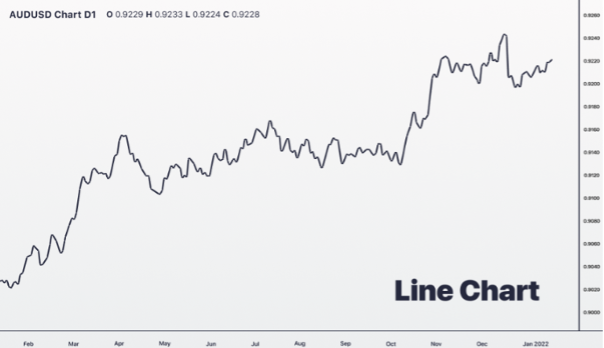
Bar Charts
👉 The line chart may be expanded in greater depth using the bar chart, which adds numerous additional critical pieces of information to each data point on the graph. The bar chart is an extension of the line chart.
👉 Consisting of a row after row of vertical lines, with each line serving as a representation of a different piece of trade information.
👉 However, they can reflect the highest and lowest prices that were seen throughout the trading session, in addition to the opening and closing prices. A horizontally shortened line depicts both the opening price and the closing price of the market.
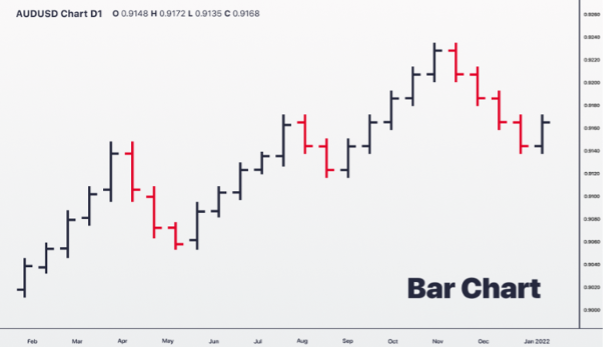
Candlestick Charts
👉 Candlestick charts plot price data as long, thin bars that evoke images of candles. Price changes throughout the time frame you choose are shown graphically using candlesticks.
👉 Except for the candlestick on the far right, which displays actual prices for the current, incomplete period, each candlestick on the chart displays the development of prices over a certain duration.
👉 A green candlestick represents an upward price movement throughout the specified time frame, closing at a higher level than it started. Conversely, a red candlestick shows that the price of the pair fell from its opening level to its closing level.
👉 In addition, four different prices for the currency pair will be shown by each candlestick.
➡️ Start of the period pricing, or “Open”
➡️ Price after the trading day, or “Close”
➡️ The price that was the highest throughout the time frame, or “High”
➡️ During the given time frame, the lowest price, or “Low”
👉 How the market is developing and whether buyers or sellers are in control of price movement may be deduced from the correlation between the four prices indicated by a candlestick.
👉 There may be a lot of purchasing pressure represented by long green candlesticks, and a lot of selling pressure represented by long red candlesticks.
👉 When a candlestick has a long wick but a short body, it means that there was a lot of pressure in one direction, but the price was pushed back before the conclusion of the trading period.
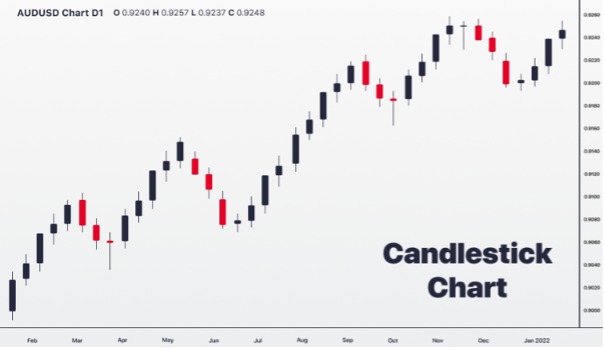
Effective Risk Management for Rwandan Forex Traders
👉 When you first start learning about trading, one of the most essential things you should focus on is learning about risk management.
👉 Traders are normally in the business of earning money, and for them to make money, they need to understand how to manage risk to succeed (potential losses). Ironically, this is one of the aspects of trading that receives the least amount of attention.
👉 Many people who trade forex are just interested in getting started as soon as possible, regardless of the number of their overall accounts.
What is Risk Management in Forex Trading?
👉 The goal of risk management is to keep your total loss to an amount that you can comfortably absorb in the event of a major, unfavourable market swing or a run of consecutive losses.
👉 Its secondary goal is to preserve a sufficient buffer from which successful trading may eventually allow you to recoup any initial losses.
👉 To be a successful trader, you must practice risk management, which is balancing the extent of your prospective losses against the initial profit potential on each new transaction inside the financial markets.
👉 One might easily become stuck in the losing position holding pattern without a disciplined approach to risk and reward.
👉 If your goal would be earning a small profit over a few hours, holding out hope that things would turn around before finally closing out for a significant loss makes little sense.
👉 Profitable trading over the long run may be thought of as the result of a synergistic relationship between:
➡️ The ratio of successful transactions to unsuccessful ones.
➡️ How much money was made, on average, in each deal, in comparison to how much money was lost
👉 Combining these proportions with the risk-reward framework is crucial. Many successful traders, for instance, incur more losses than gains on average, but turn a profit since their losses on individual transactions are often considerably lower than their gains.
👉 Others have an average profit value when compared to loss but a comparatively substantial proportion of successful situations.
How to Manage Your Risk in Forex Trading
👉 Avoiding the roller coaster of excitement and terror that may lead to rash trading decisions can be aided by having a solid set of risk-management guidelines in place.
👉 Since you have already taken reasonable precautions to reduce the likelihood of suffering a devastating monetary loss, you may approach the markets with a level head and go with the flow if you practice good risk management.
Know your Risk Tolerance
👉 Your particular risk tolerance is an important consideration since trading in every market entails some degree of uncertainty.
👉 Expert forex traders often advise risking no more than 5% of every transaction, while novices should stick to risking no more than 2% of their account balance.
👉 Thus, your degree of experience and your unique personality are the primary factors in determining the amount of risk you are willing to accept.
👉 New traders cannot afford to lose a lot of money; therefore they choose lower risk percentages since they do not yet know enough about forex trading to handle a significant loss.
👉 When you risk a larger portion of your capital, you increase the likelihood that you will go through your savings quickly if you have a losing streak. Having a competent risk management technique is preferable to gambling with a hefty sum of money on a single deal, and this is true even for expert forex traders.
Realize the importance of correct position sizing
👉 Maintain strict management over the scale of your trades and transactions. It is important to only risk a tiny percentage of your money on each deal.
👉 In every transaction you make, you should risk a little percentage of your capital. All this planning will pay off in the event of a catastrophic monetary loss by limiting it to a manageable sum.
Make sure that you have the correct Risk-Reward Ratio
👉 Every deal has associated risks that must be evaluated against potential rewards before the trader commits to it. When the potential for loss is considerable, it is not worth the effort to initiate a deal.
👉 Conversely, a cautious trader would be wise to undertake a deal if the risk involved was little. Since the potential payoff increases in proportion to the degree of risk taken, finding an optimal compromise between the two is a significant difficulty.
👉 Successful traders know that limiting their exposure is a cornerstone of their strategy. For every $50 you want to profit on a transaction, you should be prepared to lose $100, or the suggested risk-reward ratio for day traders.
👉 You will not be able to do transactions that put your whole account in danger without this protection.
Use Hedging
👉 The more of your money you risk at once, the quicker you might lose it all if you have a losing streak, which is typical. Considering this, even for the most skilled and seasoned forex traders, it is prudent to use a solid risk management technique rather than gambling with large sums of money on a single deal.
Effective Time Management
👉 Since the foreign exchange market operates around the clock, a trader who is away from their computer for even a brief period stands to lose out on potential profits.
👉 But it does not imply you have to always be trading. You need to manage your trading time well to ensure that you are always ready to take advantage of profitable chances when they come, which is a far superior technique.
👉 Since the typical forex trader also has a day job, a family, hobbies, and a social life dedicating 20 hours per week to trading is not only unrealistic but also unnecessary.
👉 You should determine how many hours each day you can devote and then stick to that schedule. Time is a precious commodity and must be managed carefully if you want to achieve trading success and pleasure.
Always use Stop-Loss Orders on Every Trade
👉 When trading, a stop loss is a crucial part of your arsenal for mitigating loss. Stop losses are designed to prevent you from incurring losses that are beyond your financial means to bear.
👉 Making ensuring your deals are safe is something on which you should always work. You should prioritize this since unexpected events are always a possibility.
Limit the capital you use when you trade
👉 The first step is to determine the total amount of money you can afford to invest in the market. Many traders and investors do both. Shares of stock and real estate are two examples of long-term assets.
👉 Trading often involves buying and selling to make a profit from small, frequent price fluctuations. Conversely, investing entails keeping assets to earn income and capital gain, often over a longer timeframe.
👉 Since investing and trading need distinct methods of strategy and risk management, it may be prudent to treat them as two distinct businesses. Think about your:
➡️ Financial Situation and Needs
➡️ Risk Tolerance
➡️ Previous Experience
➡️ Trading Objectives
👉 Rwandans must always think about ways to protect their overall wealth. The rule of thumb is to only risk money that you can afford to lose. By limiting your capital, you can make better trading decisions and reduce stress while you are in the market.
Take care to avoid weekend gaps
👉 Although forex trading shops have access to the market five days a week for the sake of making guesses, the forex market technically remains open over the weekend, with prices and global charts continuing to fluctuate in response to events that occurred outside of trading hours.
👉 Some weekends are quieter than others, but when there are significant developments over the weekend, prices can fluctuate dramatically, creating gaps that are only revealed on Monday.
👉 Even if you do not intend to take advantage of the gaps, they may still run between your stop loss and profit goal during the weekend, increasing your exposure to potential losses.
👉 Though they do not happen often, gaps over the weekend might cause problems, so it is best to be prepared for them.
Diversification of your Trading Portfolio
👉 To diversify a portfolio, one “does not keep all of their eggs in one basket,” but selects assets that are less likely to move in tandem with one another. For two assets to move in tandem and be highly correlated, they must be affected by the same forces.
👉 There may be both positive and negative correlations. When price movements are coordinated, the correlation is positive; when they are at odds, the correlation is negative.
Stay Updated with the News
👉 People searching for effective risk management may benefit from paying attention to news events, announcements, published reports, etc. Events such as job data, central bank decisions, and inflation figures are some of the most significant news items to keep an eye out for since they may cause unexpectedly huge swings in the foreign exchange market.
👉 Most forex traders prefer to make more risk-averse choices immediately after such huge news releases unless trading with gaps that occur after such events as part of their strategy.
An introduction to Forex Brokers
👉 The foreign exchange market is by far the biggest financial market in terms of traded volume, with daily trading volumes exceeding trillions of dollars.
👉 Large banks, financial institutions, funds, and multinational corporations were the only ones who could engage in forex trading before the advent of internet retail trading.
👉 What is different, however, is that currently, anybody with a broker and access to the FX market may take part in transactions.
What is the Role of a Forex Broker?
👉 Since buying and selling currencies is at the heart of every forex deal, a broker’s job is to put buyers and sellers in touch with one another. A forex broker will facilitate your deal by either matching it with other traders on their network or sending it to the interbank market.
How do Forex Brokers Make Money?
👉 There are primarily two methods used through which forex brokers might generate revenue for their businesses, and these are:
➡️ The first possible route is what we shall refer to as the “conventional” route. This is how most brokers, regardless of the sort of forex broker they are, make their living, thus it is important to understand how your broker makes money.
➡️ The second method is what we will refer to as the “alternative” pathway for the remainder of this discussion. Some forward-thinking forex brokers are increasingly diversifying their business and using other approaches for earning cash.
Market Maker Brokers
👉 A market maker or “bucketshop” model is used by several FX brokers. The purpose of their work is to level the playing field so that retail investors may participate in the foreign exchange market.
👉 To do this, they must be able to meet every deal you make on your trading platform, which they do by taking the opposite stance. They will incur a loss on every successful transaction you make since they will always have an open position in opposition to yours.
👉 If you believe the Euro would strengthen against the Dollar and hence make a profit by buying EUR/USD, you would be doing so. Well, the broker must take a position selling EUR/USD to provide you access to the market and facilitate your transaction.
👉 They have taken a selling position and would benefit from a decline in the Euro’s value or your trading losses. Remember that your forex market maker has a personal stake in keeping this information from you since they estimate that only a tiny fraction of traders will fully comprehend their business model.
Non-Market Maker Brokers
👉 Forex brokers that are not market makers have three potential revenue streams: spread, commissions, and a hybrid of the two. To begin, a forex broker makes money from the spread between the bid and ask prices of a currency pair.
👉 Additionally, NDD forex brokers may charge a fee or commission for supporting your forex trading order. In addition to commissions, NDD forex brokers might earn fees for using the trading platform.
👉 A forex trading platform, for instance, may provide its users with several complementary tools and resources at no cost (that is, you). In this case, the platform could also provide a “VIP” or “upgraded” suite of services to which you can acquire access by paying an extra, discretionary cost.
👉 In addition, NDD forex brokers may monetize their services by offering premium customization features, again for an additional price.
👉 Providers of such services may provide access to a broader choice of asset classes or currency pairings, personalized investing instruction or financial assistance, and innovative research and investment tools, among other things.
Alternative ways that Brokers Generate Money
👉 Brokers can also make money through:
➡️ Affiliate Marketing
➡️ API Partner Programs
➡️ Liquidity Financing
➡️ Interest or Fees charged on Margin Loans
➡️ Payments involved with order flow
➡️ Payment Processing Fees
➡️ Account Balance Penalties
➡️ Account Maintenance Fees
➡️ Inactivity Fees
An Introduction to Day Trading
👉 Day trading is an alternate approach for trading forex that you may use if you want to trade for short periods but are not comfortable with the fast-paced nature of scalping.
👉 This normally entails one transaction every day, and it is not carried out throughout a single night. Any price fluctuations that occur throughout the day in the relevant currency pair may either result in a profit or a loss.
👉 To engage in this kind of trading, you would need a considerable amount of time to study and monitor the transaction, in addition to having a solid grasp of how the economy may affect the pair that you are trading.
👉 Your position may be impacted if significant economic news were to break on that day. The components of day trading are:
➡️ There is no failproof method to making money in the Forex market. Though necessary, market expertise and a well-thought-out trading strategy are no assurances of profit.
➡️ There is more danger when day-to-day price swings are large.
➡️ For intraday trades, the overnight swap commissions, and costs (often referred to as “Swaps”) do not apply. Swaps often result in a negative cost to the trader in the form of a charge, although they may sometimes result in a positive benefit.
➡️ The purchase of assets with positive swaps is the basis of the Carry Trade strategy.
➡️ By using intraday trading tactics, traders may protect themselves from the potential losses that might result from the market’s volatility or a gap in prices occurs when the market is closed for the day.
➡️ Opening several deals and holding them for short periods to generate tiny gains is typical of intraday trading. Forex day trading positions contribute significantly to the market’s liquidity and are thus an important portion of the daily transaction volume.
👉 Obtaining the appropriate Forex day trading equipment is the first step in beginning Forex day trading. Intraday trading has profit potential, but it is not a straightforward process.
👉 As with any kind of trading or investment, intraday trading is not something to get into without first gaining extensive experience and instruction.
👉 Expert traders will tell you that having a trading strategy that specifies how you will handle all types of potential losses is crucial. The trader then monitors the markets for favourable entry and exit points and evaluates potential trades based on the plan’s risk/reward parameters.
👉 Day traders in Rwanda place a premium on the following:
➡️ Trading without a methodical and disciplined strategy is akin to gambling. Therefore, long-term trading success is very unlikely without discipline.
➡️ The ability to keep cool under pressure and make calculated judgments is essential for every trader.
➡️ Strategy: Stick to a predetermined trading plan that lays out the steps to take before entering the market. The trader would look for market setups that conform to the criteria outlined in his approach before taking any action.
👉 There is a fine line between jumping in to “get in on the action” when the markets are volatile and hesitating to invest after suffering a string of losses. Following one’s trading strategy to the letter might be difficult and calls for self-control.
👉 Even if you correctly anticipate a market movement and it occurs, there is no reason to rely only on your intuition when making trading decisions. Losses are inevitable if trading choices are made at random, no matter how difficult it is to forego a profit possibility.
👉 The only way to ensure long-term success and steady revenues are to stick to a tried-and-true method. Also, it is the only way to know how you are doing and how to do better.
An Introduction to Swing Trading
👉 The goal of swing trading is to make money in a short amount of time. The goal here is not to generate a profit in a single day, as in day trading. It is also not a transaction that can be left alone for months or years.
👉 Swing traders are interested in making trades for a few days to a few weeks. Again, some traders will have a shorter-than-average horizon, while others will have a much broader one.
👉 These investors rely heavily on technical analysis in their pursuit of profitable trades. That is, they are looking for potential opportunities in the market by analysing price charts.
👉 A swing trader’s focus is on short-term price fluctuations rather than the long-term trend of a currency. Swing trading benefits from the FX market’s strong liquidity, narrow spreads, and 24-hour availability (during market hours).
An Introduction to Scalping in Forex Trading
👉 Scalping is a method of trading in the foreign exchange market where positions are maintained for just a few minutes to profit from several price fluctuations.
👉 To minimize losses while amassing these modest but regular rewards is the goal of Forex scalping. Small fluctuations in price (a few pips) would be involved in such transactions, but when paired with large leverage, the potential for loss is magnified.
👉 This forex trading technique is best for individuals who can commit to and retain attention during times of heavy trading volume. Instances of heavy trade activity are:
➡️ 8 am to Noon GMT – during this time, the New York and London sessions overlap.
➡️ 7 pm and 2 am GMT – during this period, both Tokyo and Sydney sessions are open.
➡️ 3 am to 4 am GMT – during this time, Tokyo and London’s Exchanges operate.
👉 The most popular forex pairs that Rwandan scalpers can trade include:
➡️ USD/JPY
➡️ EUR/USD
➡️ AUD/USD
👉 The Importance of Market Sentiment in Forex Trading
5 Best Forex Brokers in Rwanda with Free VPS Hosting
👉 The purpose of a forex VPS (virtual private server) is to maintain a link between your trading terminal and the broader trading network. When trading from home using MT4, for instance, all your trades are executed on the usual trading network.
👉 Here are some of the top Rwandan Forex Brokers that provide free VPS hosting:
➡️ XM
➡️ HotForex
➡️ FXTM
➡️ Exness
➡️ InstaForex
XM
Min Deposit
USD 10
Regulators
IFSC, CySec, ASIC
Trading Desk
Meta Trader 4
Crypto
Yes
Total Pairs
55
Islamic Account
No
Trading Fees
Low
Account Activation Time
24 Hours
👉 For a VPS server request from XM, Rwandan traders need a minimum of $5,000 in equity. In addition, they must trade at least five round-turn lots or 500 micro round-turn lots every month to keep their free access.
👉 If a Rwandan trader does not reach this requirement, they will have $28 automatically debited from their MetaTrader 4 or MetaTrader 5 account on the first of every month to continue utilizing VPS.
HotForex
Min Deposit
USD 5
Regulators
CySEC, FSC, CFTC
Trading Desk
MetaTrader 4 and MetaTrader 5
Crypto
No
Total Pairs
47
Islamic Account
Yes
Trading Fees
Low
Account Activation Time
24 Hours
👉 Free VPS access at Hot Forex is available with a deposit of $200 or its foreign currency equivalent. Depending on your starting capital, trading account size, and other factors, you may be eligible for a free Hot Forex VPS.
👉 The cost of a VPS subscription at HotForex is $30 per month. Pay only $5,000 and you will receive the Bronze VPS plan at no extra cost. Minimum deposits of $8,000 will qualify for the free Silver VPS plan, while minimum deposits of $15,000 will qualify for the free Gold VPS package.
FXTM
Min Deposit
USD 10
Regulators
CySec, FSCA
Trading Desk
MetaTrader 4 and MetaTrader 5
Crypto
Yes
Total Pairs
–
Islamic Account
No
Trading Fees
Low
Account Activation Time
24 Hours
👉 To utilize free VPS, a deposit of at least $10 in FXTM or an equivalent amount in another currency is required. FXTM’s free VPS makes it simple for Rwandan MT4 traders to monitor their accounts and do research.
👉 Site price charts make it easy for investors to monitor market activity. The availability of over 30 technical indicators enables traders to quickly identify market trends and make swift decisions on whether to close positions.
Exness
Min Deposit
USD 10
Regulators
CBCS, CySEC, FCA, FSA, FSC, FSCA, CMA
Trading Desk
MetaTrader 4 and MetaTrader 5
Crypto
Yes
Total Pairs
107
Islamic Account
Yes
Trading Fees
Low
Account Activation Time
24 Hours
👉 To qualify for free VPS hosting with Exness, Rwandan traders must make a minimum deposit of $500 (or the KES equivalent) into their trading account. Traders may get a free VPS if they meet a few conditions, but one of them is a free margin of $100 or more.
👉 As the VPS servers used by Exness are in the same data centre as the trading servers, quotations and orders are transferred to the right server promptly.
👉 VPS is immune to external factors like a poor connection since it is constantly online. Your purchase will be fulfilled regardless of the speed or reliability of your internet connection.
InstaForex
Min Deposit
USD 1
Regulators
CySEC, FSC
Trading Desk
Metatrader 4
Crypto
Yes
Total Pairs
4
Islamic Account
No
Trading Fees
Low
Account Activation Time
24 Hours
👉 A single dollar (or its Rwandan Franc equivalent) is all that is required for Rwandan traders to get virtual private server access at InstaForex. However, you will need $1,000 or more in equity at InstaForex for this service to be provided at no cost.
👉 Additionally, the monthly fee for forex VPS hosting varies from $10 to $40 depending on the account type. InstaForex’s forex VPS service is compatible with MetaTrader 4, MetaTrader 5, a desktop version, a mobile version, and a WebTrader.
👉 This service gives you access to a powerful server for executing trades, and it also includes the latest version of the MT4 platform pre-installed on your virtual machine.
Best Forex Brokers in Rwanda
Best MetaTrader 4 / MT4 Forex Broker in Rwanda
👉 Overall, FXCM is the best MT4 forex broker in Rwanda. FXCM is an NDD broker that offers MetaTrader 4 along with other platforms. FXCM has fast trade execution with orders filled in less than 31 milliseconds.
Best MetaTrader 5 / MT5 Forex Broker in Rwanda
👉 Overall, Global GT is the best MetaTrader 5 forex broker in Rwanda. Global GT is one of a few hybrid brokers that offer Sharia-compliant trading accounts.
👉 Global GT offers 24/7 customer support and an impressive portfolio of tradable financial instruments.
Best Forex Broker for beginners in Rwanda
👉 Overall, SuperForex is the best forex broker for beginners in Rwanda. Rwandans can register an account with SuperForex with capital of $1 (1,000 RWF).
👉 There is leverage up to 1:2000 offered by SuperForex, and a negative balance is applied to all retail trading accounts.
Best Low Minimum Deposit Forex Broker in Rwanda
👉 Overall, FBS is the best Low Minimum Deposit Forex Broker in Rwanda. FBS serves traders in more than 150 worldwide countries. There is an extremely low minimum deposit of 1,000 RWF and FBS uses ECN and STP order execution.
Best ECN Forex Broker in Rwanda
👉 Overall, Pepperstone is the best ECN forex broker in Rwanda. Pepperstone is one of the largest ECN and STP brokers in the forex industry. When Rwandans use Pepperstone they can trade with confidence in a safe and regulated trading environment.
Best Islamic / Swap-Free Forex Broker in Rwanda
👉 Overall, JustForex is the best Islamic / Swap-Free forex broker in Rwanda. JustForex offers more than 170 tradable instruments that can be traded. Both MetaTrader 4 and 5 are offered to Muslim traders who use JustForex’s comprehensive Islamic Account.
Best Forex Trading App in Rwanda
👉 Overall, HF Markets is the best forex trading app in Rwanda. HF Markets has recently introduced an innovative mobile app for iOS and Android Devices.
👉 The HF Markets app allows Rwandans to monitor their account and all trading positions along with a range of other useful functions.
Best Lowest Spread Forex Broker in Rwanda
👉 Overall, Exness is the best lowest spread forex broker in Rwanda. Exness offers instant withdrawals across several deposit and withdrawal methods.
👉 Exness is a variable spread CFD and Forex broker that charges zero-pip spreads according to the account type and financial instrument.
Best Nasdaq 100 Forex Broker in Rwanda
👉 Overall, GO Markets is the best Nasdaq 100 forex broker in Rwanda. With GO Markets Rwandan traders can expect exposure to several markets including CFDs on Indices.
👉 Rwandans can participate in trading Nasdaq while using GO Markets’ comprehensive trading solutions.
Best Volatility 75 / VIX 75 Forex Broker in Rwanda
👉 Overall, IG is the best Volatility 75 / VIX 75 forex broker in Rwanda. IG offers more than 18,000 financial instruments including VIX.
👉 Rwandan traders can also expect access to powerful trading tools to help them refine their strategies when they trade the Volatility 75 Index.
Best NDD Forex Broker in Rwanda
👉 Overall, LiteFinance is the best NDD forex broker in Rwanda. LiteFinance recently rebranded from “LiteForex,” and the broker has over 500,000 registered traders worldwide.
👉 LiteFinance is an NDD broker that uses ECN trade execution to provide Rwandans with the best possible pricing.
Best STP Forex Broker in Rwanda
👉 Overall, FXTM is the best STP forex broker in Rwanda. FXTM operates globally and has offices in Africa. FXTM is a well-regulated STP forex broker that offers Rwandans between 2 and 5 decimal pricing on various financial instruments.
Best Sign-up Bonus Broker in Rwanda
👉 Overall, XM is the best sign-up bonus broker in Rwanda. An introductory $30 no-deposit offer is available to new XM customers in Rwanda. XM is a popular broker that has more than $2.5 million clients in countries worldwide.
FAQ
What is the best forex broker in Rwanda?
AvaTrade, FXTM, and XM are some of the leading brokers in Rwanda. With competitive fees and minimal spreads, AvaTrade stands itself as a top broker.
Thousands of African traders rely on FXTM because of the excellent variety of account options it provides. In terms of customer service and resources for novice traders, XM is unrivalled.
Can I legally trade forex in Rwanda?
Yes, forex trading is a legal activity and Rwandans can use the services of regulated international/offshore brokers.
How can I start trading forex in Rwanda?
Forex traders in Rwanda may discover a reliable broker at TradeForexSA, where they can also open an account to trade foreign exchange.
You should sign up for a demo account with the broker before you start trading so that you may familiarize yourself with the Forex market and the broker’s trading interface.
When you are ready, you can deposit funds into your broker account with a wire transfer or use a service like Ozow or Neteller.
Does PayPal work in Rwanda?
No, Rwanda is one of many developing countries not included in PayPal’s coverage yet.
Is Rwanda a worthwhile investment?
Yes, Rwanda is an attractive country and location for foreign investment, especially in terms of forex trading and share exchange.




